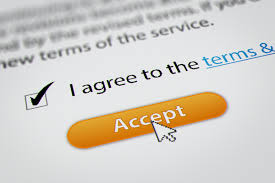We have all done it. If you want to use just about any service that is offered online or through an app on your phone, you are asked to click on a box that states that you are agreeing to the company’s “terms and conditions”. In some instances, this is done in-person and you are asked to sign on a screen which confirms you are agreeing to that company’s “terms and conditions.” Almost no one – lawyers included — ever bothers to even read the terms and conditions. What you may not realize is that by clicking on that box, you may well be entering into a binding and enforceable contract with that company. In almost every case, you are giving up important rights and protections by agreeing to those terms and conditions, which are stacked in favor of the company and against the consumer. In most cases you are waving any legal rights you have and may even be setting yourself up to reimburse that company’s legal expenses if you try to get compensated for an injury it caused you.
For example, the food delivery service DoorDash includes the following waiver of liability in its terms and conditions:
TO THE FULLEST EXTENT OF LAW, DOORDASH SHALL NOT BE LIABLE TO YOU OR ANYONE ELSE FOR ANY INDIRECT, PUNITIVE, SPECIAL, EXEMPLARY, INCIDENTAL, CONSEQUENTIAL OR OTHER DAMAGES OF ANY TYPE OR KIND (INCLUDING PERSONAL INJURY, LOST PROFITS, PAIN AND SUFFERING, EMOTIONAL DISTRESS, AND LOSS OF DATA, REVENUE, USE AND ECONOMIC ADVANTAGE).
So if the DoorDash driver crashes into your car in your driveway, or you get food poisoning because the food was left in a hot car for too long and went bad, don’t look to DoorDash for compensation for your injuries (And you’ll get nowhere suing the driver in the event he hits your car, unless the driver has commercial auto insurance, but that’s a topic for another day).
Massachusetts courts have said that a binding contract exists as long as the consumer had the ability to read the terms and conditions if he or she wanted, and then took some action (like clicking on a box in an app) that shows that the consumer agreed to the terms and conditions. It does not matter whether the consumer actually read or understood the terms and conditions.
It also does not matter that the terms and conditions are extremely one-sided against the consumer. Courts have repeatedly approved of online terms and conditions that state that the company behind the app is not liable for negligently injuring a consumer,
Even worse, if the consumer sues the company and the court finds that the terms and conditions state that the company is not liable, the consumer may well have to pay the company for the attorney’s fees the company incurs in getting the injured consumer’s lawsuit thrown out of court. That is exactly what happened in a case where someone drowned while participating in a triathlon. The Court not only threw out the widow’s case against the company that ran the triathlon, based on the electronic terms and conditions agreed to, but held that the widow was liable for the company’s attorney’s fees.
So, what should a consumer do? The honest answer is that there is not a whole lot you can do to protect yourself, other than not using the app or the particular website or service provider involved. If you want to get food delivered by DoorDash or Instacart, or do any one of a million other things online or through an app, you really have no choice but to accept the company’s terms and conditions. You can try to read and understand the terms and conditions, so you know what you are getting into, but that usually requires wading through page after page of legal language that attorneys have written. The companies take advantage of the fact that realistically no one is going to do that.
That said, there is something you can do now to protect yourself from injuries received while riding in (or if you are hit by) an Uber or Lyft vehicle – make sure your personal auto insurance has what we consider “full” coverage.
There are instances where the app or website is not set up properly, and the courts have said that no binding contract was formed. However, most companies have learned from those decisions and figured out how to follow the rules. In most instances,, once you click on that box and accept the terms and conditions, there’s not much we can do, except try to find some other source for compensation for any injuries that may occur.
Contact our experienced Massachusetts personal injury lawyers if you have been injured in a motor vehicle crash. We handle cases on a contingent fee basis, which means no money is owed unless we are successful in collecting money compensation on the case. Contact us now for a free and confidential consultation.


